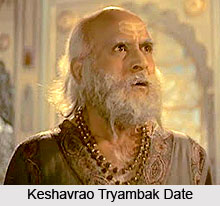 Keshavrao Tryambak Date was born in a poor family in the small village of Adiware, Ratnagiri district in the year 1889. He lost his father at the age of 6. He studied only up to the fifth standard and went to Bombay in search of a job, finding work as a compounder. After seeing some plays of the Maharashtra Natak Mandali, he developed a keen desire to become an actor. He began his career with the role of Jhunjarrao Deval`s adaptation of Shakespeare`s Othello for an amateur group, the Maharashtra Mitra Mandal under Baburao Hudalikar. In 1912 Keshavrao Tryambak Date entered the Maharashtra Natak Mandali.
Keshavrao Tryambak Date was born in a poor family in the small village of Adiware, Ratnagiri district in the year 1889. He lost his father at the age of 6. He studied only up to the fifth standard and went to Bombay in search of a job, finding work as a compounder. After seeing some plays of the Maharashtra Natak Mandali, he developed a keen desire to become an actor. He began his career with the role of Jhunjarrao Deval`s adaptation of Shakespeare`s Othello for an amateur group, the Maharashtra Mitra Mandal under Baburao Hudalikar. In 1912 Keshavrao Tryambak Date entered the Maharashtra Natak Mandali.
He started with female roles in Khadilkar`s plays. Ratnaprabha in the banned Kichakavadh i.e. `Killing of Kichaka` and Sthirmaya in Bayakanche banda i.e. `Women`s Rebellion` earned him fame, while he did male as well as female characters in Bhaubandaki i.e. `Filial Feud`. His portrayals of men, like Jayant in Gadkari`s Premsanyas i.e. `Love Renounced` in 1912, Harishchandra in Khadilkar`s Satwapariksha i.e. `Test of Merit` in 1914, or Vrindavan in Gadkari`s Punyaprabhav i.e. `Force of Virtue` in 1916, also contributed. He was one of the earliest to try realistic prose drama during the height of Sangitnatak. In 1919 he became a partner in the Maharashtra Natak Mandali.
From 1930 to 1934 he performed in various other companies such as Aundhkar`s Samarth Natak Mandali and the pioneering naturalistic Natyamanwantar, where he served both as actor and teacher, earning professional prestige and artistic success. His style moved towards expressionism, of voice and manner. He entered the movie industry and acted in V. Shantaram`s classic films for Prabhat, notably as the evil priest in Amritmanthan i.e. `Churning of the Oceans` in 1934, the liberal widower in Kunku i.e. `The Unexpected` in 1937, and the Hindu friend in Shejari i.e. `Neighbours` in 1941. He also performed as the poet in Pmtibha in 1937, the authoritarian husband madhuri kahani i.e. `Unfinished Tale` in 1939, the orthodox Brahman in Sant Tulsidas i.e. `Saint Tulsidas` in 1939 and the father in Holi in 1940. Yet his heart remained in Marathi theatre. Keshavrao Tryambak Date worked to rejuvenate it and associated with school and college dramatics. In 1954, he directed Bhaubandaki for Mumbai Marathi Sahitya Sangh, which won the top award at the first all-India Drama Festival in New Delhi.




















